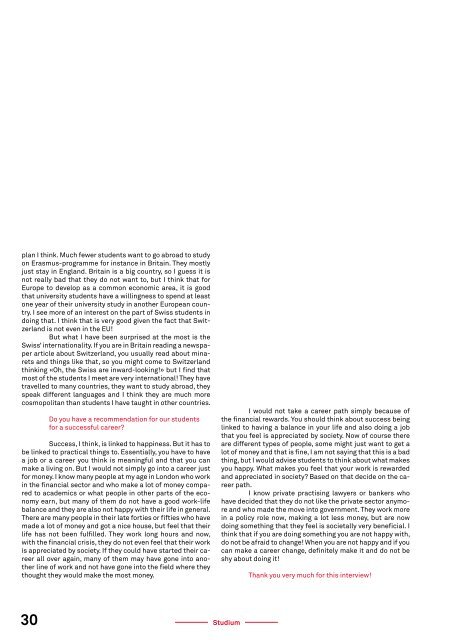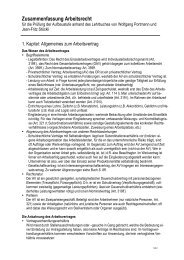Herbstausgabe 2010 - Fachverein Jus | Universität Zürich ...
Herbstausgabe 2010 - Fachverein Jus | Universität Zürich ...
Herbstausgabe 2010 - Fachverein Jus | Universität Zürich ...
Erfolgreiche ePaper selbst erstellen
Machen Sie aus Ihren PDF Publikationen ein blätterbares Flipbook mit unserer einzigartigen Google optimierten e-Paper Software.
Leben im Alumni-Haus<br />
<br />
plan I think. Much fewer students want to go abroad to study<br />
on Erasmus-programme for instance in Britain. They mostly<br />
just stay in England. Britain is a big country, so I guess it is<br />
not really bad that they do not want to, but I think that for<br />
Europe to develop as a common economic area, it is good<br />
that university students have a willingness to spend at least<br />
one year of their university study in another European country.<br />
I see more of an interest on the part of Swiss students in<br />
doing that. I think that is very good given the fact that Switzerland<br />
is not even in the EU!<br />
But what I have been surprised at the most is the<br />
Swiss’ internationality. If you are in Britain reading a newspaper<br />
article about Switzerland, you usually read about minarets<br />
and things like that, so you might come to Switzerland<br />
thinking «Oh, the Swiss are inward-looking!» but I find that<br />
most of the students I meet are very international! They have<br />
travelled to many countries, they want to study abroad, they<br />
speak different languages and I think they are much more<br />
cosmopolitan than students I have taught in other countries.<br />
Do you have a recommendation for our students<br />
for a successful career?<br />
Success, I think, is linked to happiness. But it has to<br />
be linked to practical things to. Essentially, you have to have<br />
a job or a career you think is meaningful and that you can<br />
make a living on. But I would not simply go into a career just<br />
for money. I know many people at my age in London who work<br />
in the financial sector and who make a lot of money compared<br />
to academics or what people in other parts of the economy<br />
earn, but many of them do not have a good work-life<br />
balance and they are also not happy with their life in general.<br />
There are many people in their late forties or fifties who have<br />
made a lot of money and got a nice house, but feel that their<br />
life has not been fulfilled. They work long hours and now,<br />
with the financial crisis, they do not even feel that their work<br />
is appreciated by society. If they could have started their career<br />
all over again, many of them may have gone into another<br />
line of work and not have gone into the field where they<br />
thought they would make the most money.<br />
I would not take a career path simply because of<br />
the financial rewards. You should think about success being<br />
linked to having a balance in your life and also doing a job<br />
that you feel is appreciated by society. Now of course there<br />
are different types of people, some might just want to get a<br />
lot of money and that is fine, I am not saying that this is a bad<br />
thing, but I would advise students to think about what makes<br />
you happy. What makes you feel that your work is rewarded<br />
and appreciated in society? Based on that decide on the career<br />
path.<br />
I know private practising lawyers or bankers who<br />
have decided that they do not like the private sector anymore<br />
and who made the move into government. They work more<br />
in a policy role now, making a lot less money, but are now<br />
doing something that they feel is societally very beneficial. I<br />
think that if you are doing something you are not happy with,<br />
do not be afraid to change! When you are not happy and if you<br />
can make a career change, definitely make it and do not be<br />
shy about doing it!<br />
Thank you very much for this interview!<br />
Im Frühjar 2008 eröffnete die Alumni-Stiftung der<br />
Rechtswissenschaftlichen Fakultät nicht unweit von der<br />
<strong>Universität</strong> an der Sophienstrasse das Ius Alumni-Haus. Das<br />
Haus bietet eine Plattform für den wissenschaftlichen Austausch<br />
und ist eine Begegnungsstätte für Zürcher und internationale<br />
Studierende, Dozierende, Alumni und Studentenvereinigungen.<br />
Zudem befinden sich im Alumni-Haus 16 möblierte<br />
Zimmer, die für internationale Studierende, welchen einen<br />
der Double Degree Master-Studiengänge der RWF absolvieren,<br />
vorgesehen sind. Derzeit wird das Haus noch von Erasmus-<br />
und Zürcher <strong>Jus</strong> Studenten bewohnt.<br />
Im Gemeinschaftsraum, der vom berühmten Architekten<br />
Santiago Calatrava entworfen wurde, befindet sich<br />
eine kleine Bibliothek, die einen Grossteil der fürs Studium<br />
relevanten Literatur umfasst. Oft finden sich Bewohner<br />
abends zusammen, um über Fälle zu diskutieren und verschiedene<br />
Lösungsansätze zu vergleichen. Für Prüfungen<br />
wird gemeinsam repetiert und die Studierenden helfen sich<br />
gegenseitig, den gelernten Stoff möglichst gut zu verarbeiten.<br />
Selbstverständlich kommt im Alumni-Haus auch<br />
das übrige Studentenleben nicht zu kurz. So isst man ge-<br />
meinsam zu Abend, geht zusammen zum Sport oder trifft<br />
sich zu Fernsehabenden. Den Studenten bietet sich die<br />
Möglichkeit, Kommilitonen aus allen Teilen der Welt kennenzulernen.<br />
Sei es bei Diskussionen über die verschiedenen<br />
Rechtssysteme, einen anderen Unialltag oder sei es bei Gesprächen<br />
über die unterschiedlichen Kulturen der Heimatländer.<br />
Die Schweizer Studenten werden gern gefragt, welche<br />
Regionen der Schweiz sich besonders für einen Besuch<br />
eignen; so kommt es auch immer wieder vor, dass ein Einheimischer<br />
gemeinsam mit einigen Mitbewohnern eine kurze<br />
Reise in die Schweizer Berge unternimmt.<br />
Andernorts berichten Erasmus-Studenten nach ihrem<br />
Austausch häufig, dass sie nur zu anderen internationalen<br />
Studenten Kontakt hatten. Dieser kulturelle Nachteil wird<br />
durch das Zusammenleben mit Zürchern bewusst vermieden.<br />
Dabei wird von den Erasmus-Studierenden besonders<br />
geschätzt, dass sie sich für Auskunft bei administrativen<br />
Schwierigkeiten schnell und unkompliziert an die hiesigen<br />
Studenten wenden können.<br />
Das Alumni-Haus ist schweizweit das einzige Haus,<br />
das ausschliesslich <strong>Jus</strong>-Studierende beherbergt und das<br />
den Bewohnern durch die Gemeinschaftsräume die einzigartige<br />
Chance des kulturellen, juristischen Austausches ermöglicht.<br />
30 Studium Studium<br />
31






